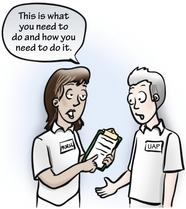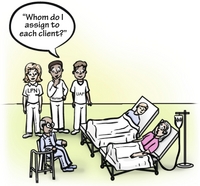Chapter 9
Leading and Managing, Delegating, and Assignment-Making Questions

The nurse is both a leader and a manager. As a leader and a manager, the nurse needs to assume many roles and responsibilities. Some of these roles include managing, organizing, and prioritizing care; making client care or related task assignments and delegating care; supervising care delivered by other health care providers; and managing time efficiently. The National Council Licensure Examination (NCLEX®) Test Plan identifies the content related to these roles and responsibilities in the Safe and Effective Care Environment Client Needs category. The Test Plan can be obtained at www.ncsbn.org. It is important to review the information related to this content area to ensure that you are well prepared for questions regarding the roles and responsibilities of the nurse as a leader and a manager. This chapter reviews these roles and responsibilities of the nurse and other health care providers, including the licensed practical or vocational nurse and the unlicensed assistive personnel. This chapter also reviews the guidelines and principles related to delegating and assignment making, which are two important roles of the nurse. In addition, this chapter identifies guidelines for time management because managing time efficiently is a key factor for completing activities and tasks within a definite time period.
 Delegation and Assignment Making
Delegation and Assignment Making
 What Principles and Guidelines Can Be Used to Delegate and Make Assignments?
What Principles and Guidelines Can Be Used to Delegate and Make Assignments?

Principles and Guidelines for Delegating and Assignment Making
1. Always ensure client safety—never select an option that could potentially harm the client.
2. Focus on the subject of the question and what the question is asking; for example, is the question asking you to delegate to another registered nurse, a licensed practical or vocational nurse, or unlicensed assistive personnel?
3. Determine which tasks or client care activities can be delegated and to whom and match the task to the delegatee on the basis of the nurse practice act, agency policies and procedures, or position descriptions as appropriate; that is, think about the activities that the delegatee can safely and legally perform.
4. Think about individual variations in work abilities, and determine the degree of supervision that may be required; for example, if the question asks you to delegate or assign a client care activity to a new graduate, then you must think about the need for providing adequate supervision and the need to teach the new graduate about the assigned activity.
5. Always provide directions to the delegatee that are clear, concise, accurate, and complete and that validate the person’s understanding of the directions and expectations; that is, ask the delegatee to verbalize the procedure for performing the task or activity that was delegated.
6. Communicate a feeling of confidence to the delegatee, and provide feedback promptly after the task or activity is performed regarding his or her performance; ensure that the delegatee completed the task, and evaluate the outcome of the care provided.
7. Provide the delegatee with a timeline for completion of the task or activity; for example, if a client is scheduled for a diagnostic test and an activity or task needs to be completed before the test, it is important to identify this timeline to the delegatee.
8. Maintain continuity of care as much as possible when assigning client care; for example, it is best for the client to be cared for by a nurse with whom the client has developed a therapeutic relationship. However, it is also important to remember that in some client situations, maintaining continuity of care would be unfavorable with regard to ensuring a safe environment for a health care provider, such as with the client with an infectious disease or the client with a radiation implant.
Stay updated, free articles. Join our Telegram channel

Full access? Get Clinical Tree




